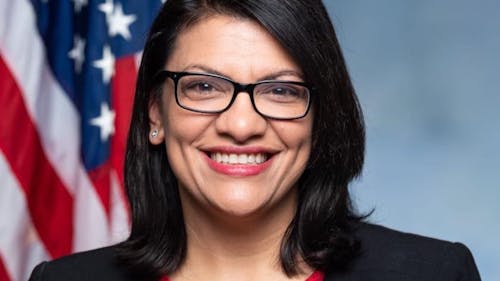Klein, care workers, flesh out issues in Green New Deal

Care Work is Climate Work: A Series on the Green New Deal, was a panel event moderated by Gloria Steinem Endowed Chair in Media, Culture and Feminist Studies Naomi Klein at Douglass Student Center on Oct. 7 as a way to fill in the blanks about an important, yet undiscussed, component of the Green New Deal.
After the shuffling in of all sorts of professors, students and eager activists, Klein started the event by outlining what her position as Gloria Steinem chair entails. She defined it as a collaboration between the School of Communication and Information and the Department of Women’s and Gender Studies that works to make connections and cross boundaries. She went on to explain that her role as chair encouraged her to designate a three-part series on climate change, with the first one being about care work.
Klein detailed what the Green New Deal is, and why the topic of care work is so critical in any discussion of the deal, yet too often left out. She first acknowledged that despite its push from liberal Rep. Rashida Tlaib (D-Mich.) and Rep. Alexandria Ocasio-Cortez (D-N.Y.), the Green New Deal is not a new idea, having its roots in the Global South and front line communities of color.
Klein then defined what care work is and why she believes it to be so important when discussing the Green New Deal. Examples of care work include healthcare and childcare, and usually involve labor of women, people of color and immigrants. She detailed harrowing descriptions of how during climate catastrophes, care workers instantly become first responders and must make important decisions about people’s lives and safety.
Next, the panelists were introduced. Perhaps the most impressive part of the event were the panelists that spoke. Differing in background, race, ethnicity and profession, the four women chosen to speak about their experience with care work and climate change were impactful in their own communities and brought all sorts of differing and relevant information to the discussion.
Klein asked questions to each panelist about how their specific experience with care work interplays with the Green New Deal. Each woman described in great detail their astonishing experiences. Often, the personal nature of the subject resulted in the panelists getting choked up and moved to tears. It was hard not to shed a tear when the women were describing some of their own or their community’s experience with death and destruction because of climate crisis.
The first to speak was Emily Comer, a teacher and organizer from West Virginia whose work was critical in the teacher strikes that occurred last year. She talked about how being on the front lines of fossil fuel mining zones add on to the issues in Appalachia, and said, “Kids are vulnerable anyways without climate crises, but with flooding … those vulnerabilities are exacerbated.”
The next panelist introduced was Aquilina Soriano Versoza, whose extensive career includes being a founder and executive director of the non-profit Pilipino Workers Center of Southern California. Her work with Filipino home care workers represented an interesting dynamic as she worked with two vulnerable communities — care workers and elderly people.
The third panelist to speak was Dara Baldwin, who, among other accomplishments, is the director of National Policy for the Center for Disability Rights, Inc. (CDR). She used her position on the panel to express the importance of ensuring that people with disabilities are granted the highest care during catastrophes.
She also reminded everyone of the voices that were not represented on the panel and that are often unheard or overlooked. Baldwin made it clear that change would have to come under collective liberation, and said, “If I’m moving forward and you’re not moving forward, then none of us are.”
The last panelist introduced was Nella Pineda-Marcon, a nurse who volunteered on several medical missions that sparked her climate activism. Her perspective allowed for the audience to understand just how extensive these disasters are, as she experienced it firsthand.
At the end of the panel, one was overcome with a sense of relief at having a discussion that is too often pushed to the back burner for various political reasons. Yet there was also this feeling of great urgency.
“We are in this era of climate destruction, but what really kills is isolation,” Klein said at the end of the event. She explained how she hopes that this is just the beginning of more conversations that link important sectors together, especially given the impending doom of catastrophes brought on by climate change.



